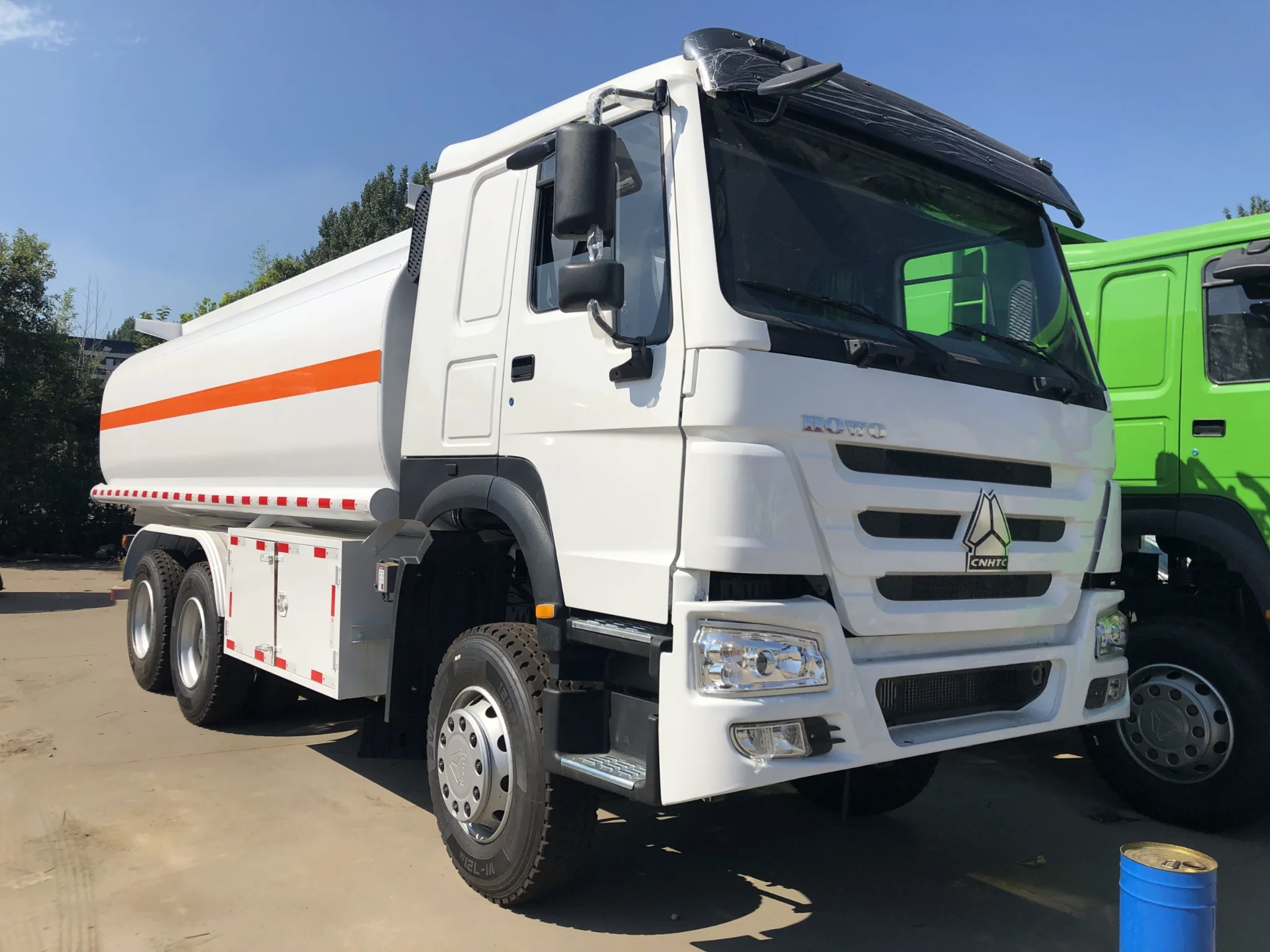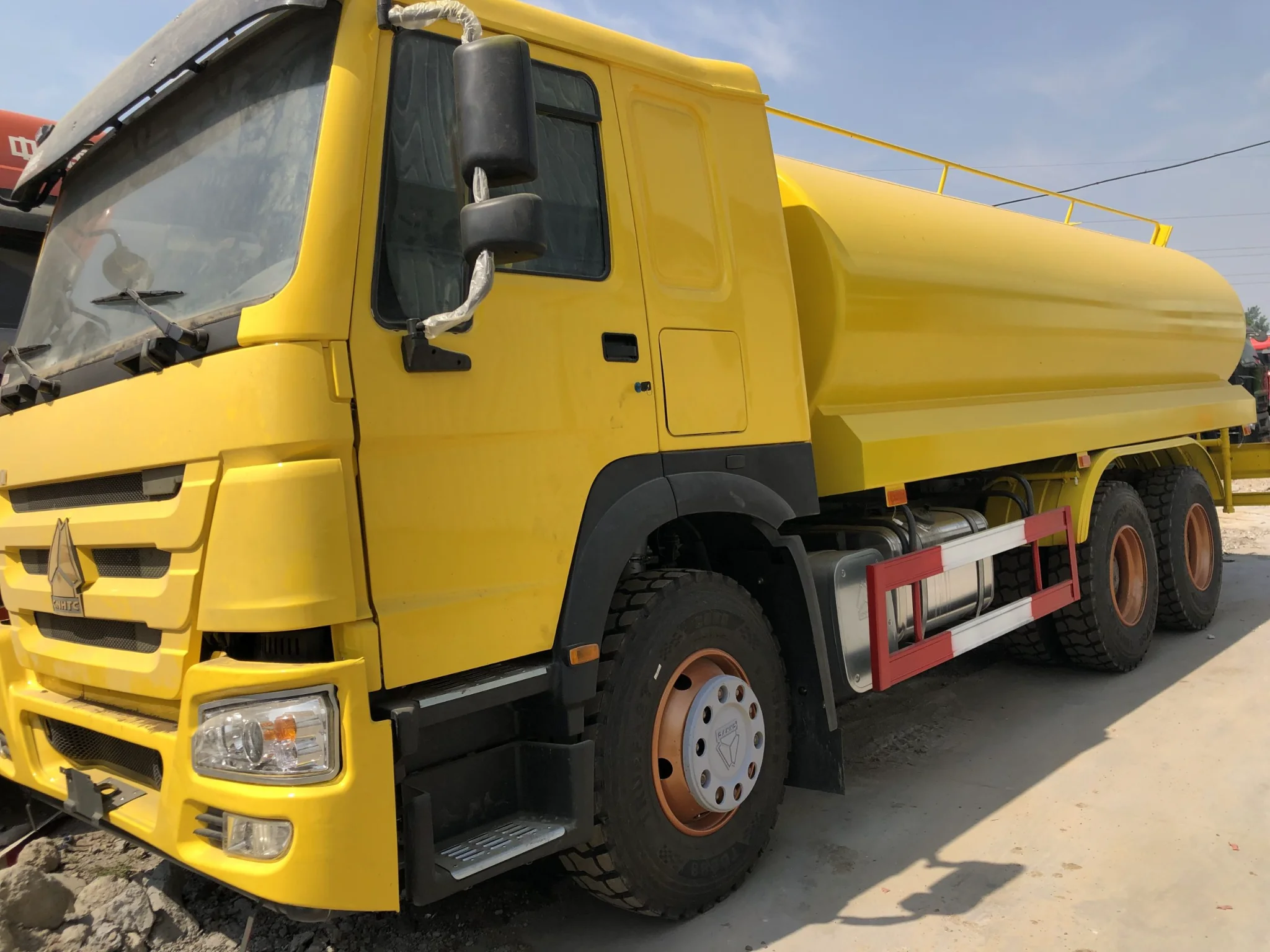Kununua Magari ya Maji Yakaporeshwa: Uchunguzi Muhimu Kila Kilimwa Anapaswa Kufanya

Maji ni kazi. Ikiwa unaendesha shamba, kusimamia mashamba, kutunza mifugo, kushughulikia udhibiti wa vumbi barabarani za vijijini, au kusaidia mviriji katika msimu wa kavu, tayari unajua hilo. Inaaminika maji spray lori kwa ajili ya kilimo Si tu "nzuri kuwa na", ni vifaa. Tatizo ni kwamba malori mapya ya maji ni ghali, ni vigumu kupata katika baadhi ya mikoa, na mara nyingi hupimwa zaidi kwa kile unachohitaji kwenye tovuti.
Ndiyo sababu lori la maji lililofanywa upya limekuwa chaguo la vitendo kwa waendeshaji wengi wa kilimo na makandarasi ya kilimo. Bado unapata uwezo wa tanki, nguvu ya pampu, na uwezo wa barabara, bila kulipa bei ya kitengo kipya. Lakini kuna catch: si kila lori kuuzwa kama "upya" ni kweli kujengwa upya kwa ajili ya kazi. Baadhi ni tu kuoshwa na kuchora.
Chini ni nini unataka kuangalia kabla ya pesa kuhamia, hasa kama wewe ni kuangalia kwa kutumika HOWO maji lori au sawa kazi nzito kitengo kwa ajili ya matumizi ya kilimo.
Kwa nini Wakulima Wanunuza Magari ya Maji yaliyorekebishwa
Kwa ajili ya kilimo, lori la maji hufanya zaidi ya kuvunza shamba. Matumizi ya kawaida ya kila siku inaonekana kama hii:
-
Msaada wa mviriji kwa ajili ya mazao katika maeneo bila mifumo ya bomba halali
-
Kuzuia vumbi kwenye barabara za upatikanaji na maeneo ya kazi
-
Kuofa mifugo / kusafisha paddock
-
Moto kudhibiti backup katika msimu kavu
-
Compacting udongo au mkusanyiko wakati wa tovuti maandalizi
Kama wewe ni kuhamisha maji siku nzima, wewe kujali zaidi ya tu horsepower. Unahusu Uptime.
Lori la maji lililofanywa upya linaweza kutoa thamani nzuri ikiwa (na tu ikiwa) mifumo muhimu ilikuwa kwa kweli inahudumiwa. Bei ni sababu moja, ndiyo. Lakini nini wanunuzi wengi wanataka ni: Je, inaweza kuanza kazi siku inayofika, au wewe wrenching katika wiki ya kwanza?
Nini cha Kuchunguza Kabla ya Kununua
Wakati wewe ni kutathmini a maji spray lori kwa ajili ya kilimoFikiria katika mifumo. Tanki. Pampu. Chassis. Powertrain. Udhibiti.
Tank Mwili Na Welds
Hii ndiyo mahali ambapo makubaliano mengi yanaenda mabaya.
Unataka kuangalia:
-
Vifaa vya tank (mara nyingi chuma cha kaboni kwa ajili ya kudumu katika ujenzi na matumizi ya kilimo)
-
Weld mistari na pete kuimarisha
-
Ishara za kutu, pitting, au sahani patch
-
Rangi safi tu karibu na eneo moja la ukarabati
Kama ukuta wa tanki ni thinning au tayari patched, shinikizo inaweza kushuka au kuvuja inaweza kuanza chini ya mzigo. Hutaki lori ambalo hupoteza nusu ya maji yake kwenye gari kutoka kisimo hadi shamba.
Tip: kuuliza kiasi cha tank na shinikizo la kazi. Mtengenezaji mkubwa anapaswa kujua wote wawili.
Pampu, valves, na spray mistari
Lori hilo ni muhimu tu kama mfumo wake wa pampu na dawani.
Kuuliza muuzaji kweli kuendesha pampu na kufungua vifaa vurugaji. Wewe ni kuangalia:
-
Shinikizo la maji kwenye bar ya kupuuza nyuma
-
Ushirikiano katika kushoto / kulia / nyuma nozzles
-
Yoyote ya kuonekana drip kutoka fittings na viungo
-
Smooth wazi / kufunga juu ya valves kudhibiti
Lori nzuri ya maji iliyosafishwa itavuruga kwa muundo thabiti bila kukohola, kupiga, au kuwa dhaifu baada ya sekunde 30. Pato dhaifu kawaida ina maana pampu uchovu au mstari clogged. Kubadilisha mistari na mihuri ni ya kawaida. Kuita welder kurekebisha tanki cracked si.
Injini Na Usafirishaji
Magari mengi ya maji ya shamba ya kuaminika ni vitengo vya dizeli vya nguvu za farasi (kwa mfano, mpangilio wa 6×4 na 371 HP rating ni kawaida katika darasa hili). Nguvu ya farasi ya juu ni muhimu wakati wewe ni kuhamisha tanki kamili juu ya uchafu laini, si tu barabara paved.
Kuhusu ukaguzi:
-
Baridi kuanza lazima kuwa nguvu, bila crank muda mrefu
-
Uchunguzi nyeupe au bluu moshi katika idle
-
Hakuna kuvuja mafuta karibu na gaskets kubwa
-
Hakuna harufu ya mafuta ya kuchomwa kutoka kwa injini ya injini
Wakati wa mabadiliko: gear lazima kushiriki bila kusaga ngumu au kuchelewesha muda mrefu. Mabadiliko ya polepole au ya kutoroka ni ishara kwamba unarithi tatizo la mtu mwingine.
Chassis, Matairi, Kusimamishwa
Watu wanazingatia tanki na kusahau sehemu ambayo kweli inagusa ardhi.
Angalia:
-
Frame reli: moja kwa moja, hakuna bends, hakuna stress cracks karibu na suspension hangers
-
Matairi: hata kuvaa katika tread, hakuna uharibifu mkubwa sidewall
-
Kusimamishwa: hakuna mifuko ya hewa ya ufungufu au chemchemi za majani zilizovunjwa
-
Undercarriage: hakuna nzito kutu scaling
Unataka sura ambayo inaweza salama kubeba tanki kamili ya maji kwa kasi ya chini juu ya ardhi mbaya. Reli ya frame iliyofungwa ni mpango wa kuvunja. Huwezi "kupata njia yako" kutoka kwa hilo.
Cabin Na Mfumo wa Udhibiti
Inaonekana ndogo, lakini ni muhimu katika matumizi halisi.
Angalia kwamba:
-
Udhibiti sprayer katika cabin kujibu (wazi / karibu / muundo kuchagua)
-
Kazi ya vipimo (shinikizo la mafuta, joto la baridi, shinikizo la hewa ikiwa linatumika)
-
Taa, viashiria, pembe, wipers kazi yote
-
A / C na blower kukimbia si anasa, lakini waendeshaji kufanya kazi katika hali ya hewa ya moto kabisa huduma
Katika mazoezi, kiti chafu si jambo kubwa. Dashboard iliyo kufa na taa za onyo kila mahali iko.
Hapa ni meza ya kulinganisha haraka ambayo inaonyesha jinsi ya kufikiri kuhusu lori halisi iliyotengenezwa dhidi ya moja ambayo imekuwa imeoshwa tu:
| Kipengele | Kitengo cha Upya | Tu kusafishwa / repainted Unit |
|---|---|---|
| Hali ya Tank | Welds kuangaliwa, kuvuja fixed, hakuna pitting mbaya | Rangi safi kuficha sahani patch |
| Pampu & amp; ya sprayer | Ilijaribiwa chini ya shinikizo, hata muundo wa vurugu | Muzaji "hawezi demo leo" |
| Chassis / Frame | Reli moja kwa moja, tu mdogo, kusimamishwa hatari | Bends inayoonekana, kuvaa tayari isiyo sawa |
| Injini / Usafirishaji | Kuanza kwa nguvu, mabadiliko ya kawaida, hakuna moshi mzito | Long crank, gear sliding |
| Udhibiti wa Cabin | Kazi gauges na swichi sprayer | Dead gauges, viwango vya kupotea |
Ikiwa unaona sifa nyingi za safu ya mkono wa kulia, weka mkoba wako katika mfuko wako.
Ishara za Upanuzi halisi (Si tu "Touched Up")
Katika usawa, kila orodha inaonekana kuwa nzuri. “Hali nzuri. Tayari kufanya kazi.” Maneno hayo peke yake hayamaanishi chochote.
Kawaida ukarabati halisi ni pamoja na:
-
Huduma ya pampu au ubadilishaji
-
New au huduma valves na hoses
-
Kuchunguza umeme na taa
-
Kuboreshwa au kuimarishwa spray bar
-
Matairi ambayo yanalingana na salama, si mabaki manne ya random
Nyaraka zaidi unayopata picha za kazi, maelezo ya huduma, hata video fupi ya lori spraying ujasiri zaidi unapaswa kuhisi. Wauzaji mbaya pia wanaweza kuelezea uwezo wa tanki, upana wa vurugu, na mpangilio wa gari bila kudhani.
Ikiwa muuzaji hawezi kuonyesha mfumo wa kunyunyika kwenye lori la kunyunyika maji kwa ajili ya kilimo, hiyo ni ishara yako ya kwanza ya onyo.

Kufanya kazi na muuzaji wa kuuza nje
Kuna ukweli mwingine hapa. Wengi wa wanunuzi wa lori za maji zilizotengenezwa si wanunuzi wa ndani. Wao ni wanunuzi kutuma kitengo kwa mkoa mwingine au nchi nyingine kwa ajili ya mviriji, udhibiti wa vumbi, au kazi barabara. Mara moja meli lori, kurudi si rahisi.
Hii ndiyo mahali ambapo vyanzo ni muhimu.
Liangshan Tuoda International Trade Co, Ltd. vifaa kutumika malori ya kibiashara kwa wanunuzi wa nje ya nchi, ikiwa ni pamoja na upya maji malori jamii na vitengo vigumu kama vile kutumika HOWO maji malori configured kama 6× 4 sprinkler. Mchakato wa kampuni si tu "kuchukua picha na meli." Magari ni kuangaliwa kwa ajili ya mifumo ya kazi ya msingi kwanza - uadilifu wa tank, pato pampu, kazi ya bar kuvunza, hali ya sura, hali ya breki - kisha tayari kwa ajili ya kuuza nje. Uwanja wa huduma pia ni pamoja na msaada wa kupakia, maandalizi ya usafirishaji, na nyaraka, ambayo ni muhimu kwa wateja ambao wanahitaji lori kufanya kazi hivi karibuni baada ya kuwasili, si kukaa katika uwanja kusubiri ukarabati.
Kiwango hicho cha maandalizi ni muhimu, kwa sababu ikiwa unanunua kwa mbali, kimsingi unaamini ukaguzi uliotokea kabla ya mlango wa chombo kufungwa.
Uchunguzi wa mwisho kabla ya kujitolea
Kabla ya kusaini, ulize mambo haya manene:
-
Picha wazi za tanki, reli ya sura, na gari la chini
-
Video mfupi mtihani wa mfumo spray kuendesha
-
Nambari za injini na chassis ambazo zinalingana na karatasi
-
Muda wa usafirishaji na msaada wa forodha
Ikiwa yoyote ya haya inageuka kuwa majibu yasiyotolewa, polepole. Lori inaweza kuwa nzuri - au inaweza kuwa nzuri nje, kuvunjwa ndani.
Hitimisho
Lori la maji lililofanywa upya linaweza kujilipa haraka kwenye shamba: kunywa safu za mazao ambapo mistari ya mvirijizi haifikiri, kuweka vumbi chini kwenye barabara zisizo za kufunga, kuosha maeneo ya wanyama, hata kusaidia kudhibiti moto. ya kutumika HOWO maji lori na dizeli yenye nguvu na mfumo wa kuvunza kazi inaweza kufanya yote hayo, siku baada ya siku.
Lakini kununua kitengo kibaya utagharimu mara mbili - mara moja kununua, mara moja kurekebisha.
Angalia kwenye tanki. Angalia pampu. Angalia mfumo. Kuomba ushahidi, si ahadi.
Maswali ya kawaida
Q1: Ni nini muhimu zaidi wakati wa kununua lori ya maji iliyosafishwa?
A: Tank na mfumo wa pampu. Kama tanki ni dhaifu au pampu hawezi kuweka shinikizo, lori hawezi kufanya kazi yake. Daima kuuliza kuona mfumo wa kunyunyika kufanya kazi kwenye video au binafsi.
Swali la 2: Unajuaje kama lori la maji la HOWO lililotumiwa lilikuwa halisi karibunishwa?
J: Angalia ishara za kazi halisi: pampu ya huduma, muundo mzuri wa vurugaji, sura imara, matairi yaliyofanana, vipimo vya kazi. Rangi mpya peke yake haimaanishi upya.
Q3: Je, lori la kunyunyika maji kwa ajili ya kilimo ni nzuri kwa zaidi ya mviriji?
Jibu: Ndiyo. Mashamba na wakandarasi hutumia malori haya kwa kudhibiti vumbi barabarani, maeneo ya kusafisha mifugo, kutengeneza udongo, na kudhibiti moto wa dharura wakati wa msimu wa kavu.
Q4: Kwa nini kununua kutoka kwa muuzaji wa nje badala ya kuuza upya ya ndani?
J: Mzunguzi wa nje na uzoefu kama Liangshan Tuoda International Trade Co., Ltd. inachunguza mifumo muhimu, huandaa nyaraka, na meli lori ambalo ni kazi tayari. Hii ni muhimu kama lori ni kwenda moja kwa moja kwenye tovuti ya kazi baada ya kuwasili.
Q5: Ninapaswa kuomba nini kabla ya kulipa amana?
Jibu: Ulize picha za hivi karibuni za chini ya gari, video ya mtihani wa kuvunza, video ya kuanza injini, na namba ya chassis iliyothibitishwa. Kama muuzaji anakataa, usiendelee mbele.

